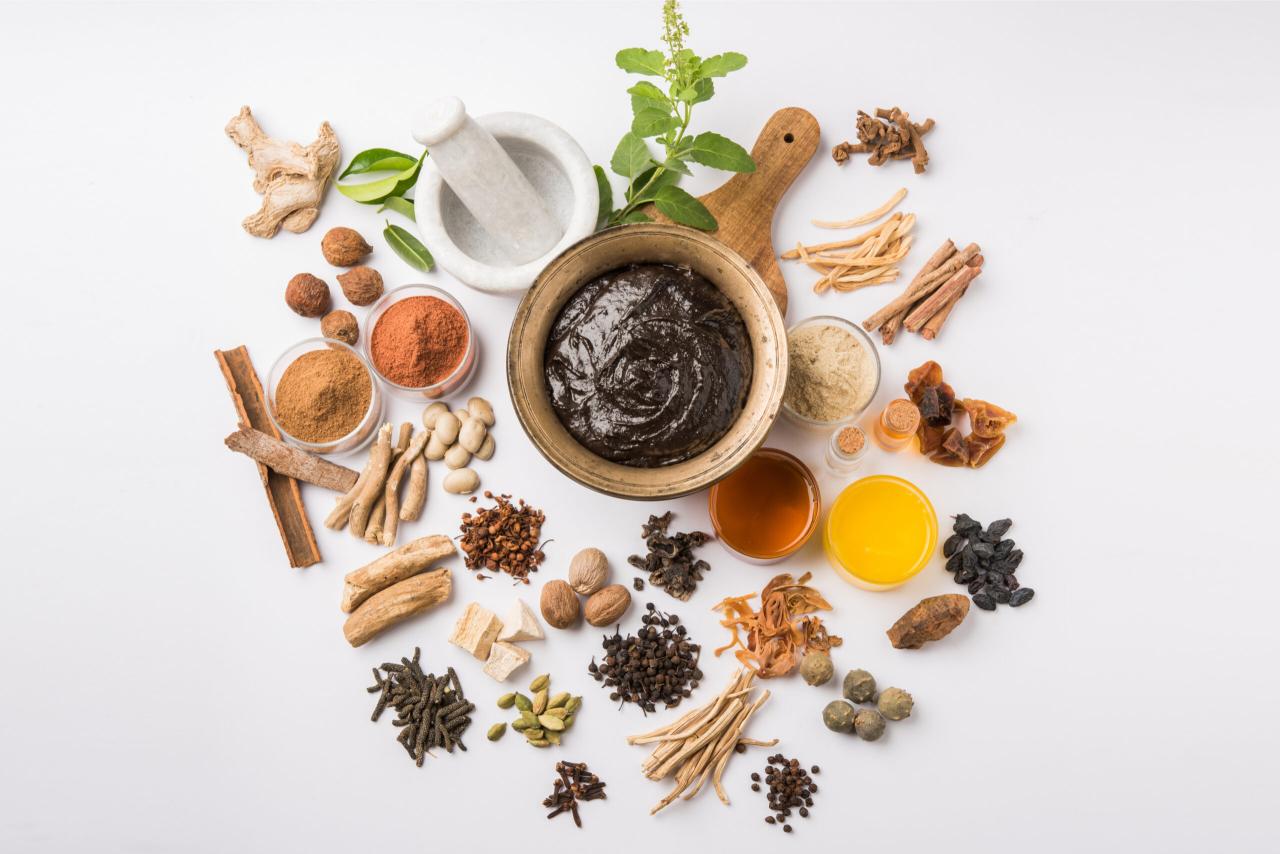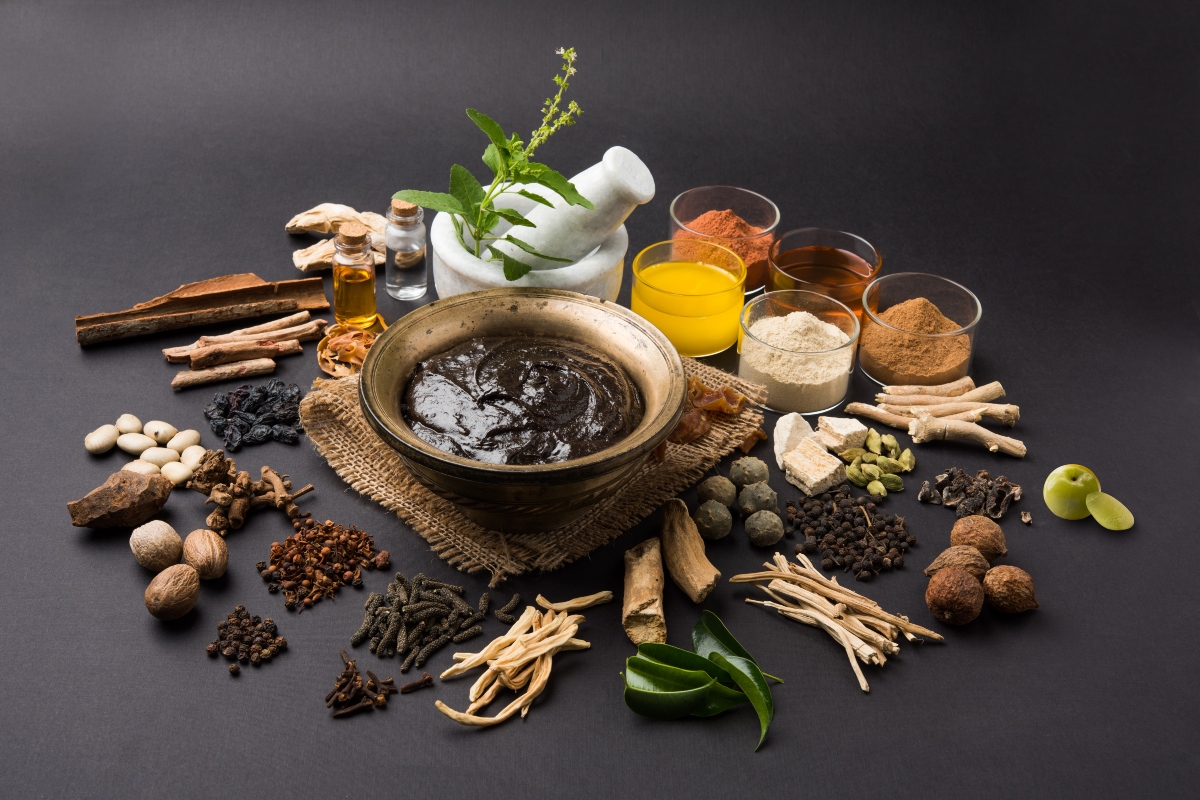Embark on a journey exploring the realm of Ayurvedic herbs for immunity, delving into the ancient wisdom and healing properties they possess. Discover the power of nature’s remedies in enhancing your body’s defense mechanisms and overall well-being.
Introduction to Ayurveda and Immunity

Ayurveda, an ancient system of medicine originating in India, focuses on achieving balance and harmony within the body to promote overall health and well-being. It is based on the principles of maintaining a balance between the mind, body, and spirit to prevent illness and promote longevity.
In Ayurveda, immunity is known as “Ojas,” which represents the body’s natural defense system against diseases and infections. It is believed that a strong immune system is essential for maintaining good health and preventing illnesses.
Importance of Using Herbs for Boosting Immunity
Using herbs in Ayurveda to boost immunity is a common practice that has been followed for centuries. Herbs are natural remedies that are believed to have powerful healing properties and can help strengthen the body’s immune response. These herbs are rich in antioxidants, vitamins, and minerals that support the immune system and help the body fight off infections and diseases.
Incorporating immune-boosting herbs into your daily routine can help improve your overall health and well-being.
Key Ayurvedic Herbs for Immunity

Ayurveda, the ancient holistic healing system, offers a variety of herbs that are known for their immune-boosting properties. These herbs work in synergy to strengthen the body’s defense mechanisms and promote overall well-being.
Tulsi (Holy Basil)
- Tulsi is revered in Ayurveda for its powerful immune-boosting properties.
- It helps in reducing stress, inflammation, and respiratory issues.
- The antioxidants present in Tulsi protect the body from free radical damage.
Ashwagandha
- Ashwagandha is known for its adaptogenic properties that help the body adapt to stress.
- It boosts immunity by enhancing the activity of immune cells.
- Regular consumption of Ashwagandha can improve overall vitality and strength.
Amalaki (Indian Gooseberry)
- Amalaki is rich in Vitamin C, which is essential for a healthy immune system.
- It supports the body’s natural defenses and helps in detoxification.
- Amalaki also aids in digestion and promotes healthy skin.
Methods of Using Ayurvedic Herbs

Ayurvedic herbs can be consumed in various ways to boost immunity and overall health. These methods include incorporating them into your diet, preparing herbal teas, using herbal supplements, and applying herbal oils topically for certain herbs.
Consuming Ayurvedic Herbs in Your Diet
- Include immune-boosting herbs like turmeric, ginger, and garlic in your daily meals.
- Season your dishes with immune-enhancing herbs like cumin, coriander, and cinnamon.
- Blend fresh herbs like basil, mint, and cilantro into smoothies or juices for added benefits.
Preparing Herbal Teas
- Brew a tea using holy basil (Tulsi), licorice root, and ashwagandha for immune support.
- Combine ginger, cinnamon, and cardamom in hot water for a warming immunity-boosting tea.
Using Herbal Supplements
- Take Ayurvedic herbal supplements like Chyawanprash or Triphala daily for a strong immune system.
- Consult an Ayurvedic practitioner for personalized herbal supplement recommendations based on your constitution.
Topical Application of Herbal Oils
- Massage the body with sesame oil infused with herbs like turmeric and neem for skin health and immunity.
- Apply herbal oils like Brahmi oil or Ashwagandha oil to the scalp for stress relief and immune support.
Safety and Precautions
When using Ayurvedic herbs for immunity, it is important to consider safety and precautions to avoid any potential side effects or interactions. Certain individuals should also avoid specific herbs to prevent adverse reactions. Additionally, guidance on dosage and duration of use is crucial for overall safety and effectiveness.
Potential Side Effects and Interactions
- Ashwagandha: May cause drowsiness and stomach upset. Interacts with medications for diabetes, high blood pressure, and thyroid disorders.
- Tulsi (Holy Basil): Can lower blood sugar levels. May interact with medications for diabetes and blood thinners.
- Amalaki (Indian Gooseberry): High doses may cause digestive issues. Can interact with blood thinners and medications for diabetes.
Who Should Avoid Certain Ayurvedic Herbs
- Pregnant or breastfeeding women should avoid herbs like Ashwagandha, Shatavari, and Guduchi without consulting a healthcare provider.
- Individuals with autoimmune diseases should be cautious with immune-boosting herbs like Guduchi and Licorice.
- Children and elderly individuals should consult a healthcare provider before using Ayurvedic herbs for immunity.
Guidance on Dosage and Duration of Use
- It is recommended to start with a low dose of any Ayurvedic herb and gradually increase as needed.
- Consult an Ayurvedic practitioner or healthcare provider to determine the appropriate dosage based on individual health conditions and needs.
- Avoid long-term use of certain herbs like Licorice, as it may lead to potassium loss and other side effects.
Ultimate Conclusion
In conclusion, the world of Ayurvedic herbs for immunity is a vast and fascinating one, rich with benefits and possibilities. By incorporating these natural remedies into your routine, you can bolster your immune system and nurture your health in a holistic way.
Essential Questionnaire
Are Ayurvedic herbs safe for everyone to use?
Ayurvedic herbs are generally safe for most individuals, but it’s recommended to consult with a healthcare provider before starting any new herbal regimen, especially if you have existing health conditions or are pregnant.
What are some common Ayurvedic herbs known for boosting immunity?
Popular Ayurvedic herbs for immunity include Ashwagandha, Tulsi (Holy Basil), Amla (Indian Gooseberry), Giloy, and Turmeric.
Can Ayurvedic herbs interact with medications?
Yes, some Ayurvedic herbs may interact with certain medications, so it’s crucial to inform your healthcare provider about any herbs you are taking to avoid potential interactions.
How long should one typically use Ayurvedic herbs for immunity?
The duration of use for Ayurvedic herbs can vary based on individual needs, but it’s advisable to follow recommended guidelines and consult with an Ayurvedic practitioner for personalized guidance.